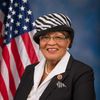Help us improve in just 2 minutes—share your thoughts in our reader survey.
North Carolina election preview, 2024: Difference between revisions
| Line 153: | Line 153: | ||
Republicans have a 30-20 majority the state Senate and a 69-47 majority in the state House with four vacancies. The last time Democrats controlled either chamber of the Legislature was in 2010, when Democrats controlled both chambers. | Republicans have a 30-20 majority the state Senate and a 69-47 majority in the state House with four vacancies. The last time Democrats controlled either chamber of the Legislature was in 2010, when Democrats controlled both chambers. | ||
Because the governor is a Democrat, North Carolina is one of 10 states with a [[ | Because the governor is a Democrat, North Carolina is one of 10 states with a [[State government trifectas|divided government]]. It has held this status since 2017 when Gov. [[Roy Cooper]] (D) assumed office. North Carolina's [[Attorney General of North Carolina|attorney general]] and [[North Carolina Secretary of State|secretary of state]] are Democrats. This makes North Carolina one of 20 states with a [[State government triplexes|Democratic triplex]]. | ||
===Past presidential election results in North Carolina=== | ===Past presidential election results in North Carolina=== | ||
Latest revision as of 16:05, 9 October 2024
| Election Analysis Hub, 2024 |
| Election analysis |
|---|
| Top 15 elections to watch Municipal partisanship Uncontested elections Competitiveness reports: Congress State executives State legislatures |
| Elections coverage |
| Election results, 2024 Election previews Congressional elections State government trifectas State legislatures State executives Governors Municipal elections Mayoral elections |
| Previews by state |
Last updated: Oct. 9, 2024
Thousands of general elections are taking place across the United States on Nov. 5, 2024. Those elections include offices at the federal, state, and local levels. This is one of 50 pages in which Ballotpedia previews the elections happening in each state as part of the Daily Brew’s 50 states in 25 days series.
This page provides an overview of all elections happening in North Carolina within our coverage scope on Nov. 5, 2024. Those elections include the gubernatorial election 14 for U.S. House, all 50 state senate seats, and all 120 state House seats. Additionally, there is one statewide ballot measure on the ballot in North Carolina. This page also includes more information about election day in North Carolina, including:
- How to vote in North Carolina
- The elected offices that North Carolina voters can expect to see on their ballots
- The races in North Carolina that Ballotpedia is covering as battlegrounds
- The ballot measure that voters in North Carolina will decide on
- Ballotpedia's Sample Ballot Lookup Tool
- The partisan balance of North Carolina's congressional delegation and state government
- Past presidential election results in North Carolina
- The competitiveness of legislative elections in North Carolina
- The candidates who are on the ballot in North Carolina
Voting information
- See also: Voting in North Carolina
What's on the ballot?
2024 elections
- See also: North Carolina elections, 2024
At the federal level, North Carolina voters will elect 14 U.S. Representatives. To learn more about the U.S. House elections in North Carolina, click here.
Voters will elect a governor. Josh Stein (D), Mark Robinson (R), Wayne Turner (G), and Mike Ross (L) are running in the general election.
North Carolina will also elect nine other state executive officials: lieutenant governor, attorney general, secretary of state, auditor, treasurer, superintendent of public instruction, labor commissioner, insurance commissioner, and agricultural commissioner.
All 170 seats in the Legislature are up for election, including all 120 seats in the House and all 50 seats in the Senate. There are 15 open seats in the House and six open seats in the Senate.
North Carolina is holding school board elections this year. As a part of Ballotpedia's coverage of the 100 largest cities by population and 200 largest school districts by student enrollment, we are covering North Carolina school board elections in six school districts: Cabarrus County Schools, Cumberland County Schools, Guilford County Schools, Johnson County Schools, Union County Public Schools, and Wake County Public School System.
At the municipal level, the cities of Raleigh and Winston-Salem are holding elections for mayor and city council. Five counties are holding elections for Register of deeds, board of commissioners, soil and water conservation district, district court judges, and superior court judges: Durham County, Forsyth County, Guilford County, Mecklenburg County, and Wake County.
Below is a list of North Carolina elections covered by Ballotpedia in 2024. Click the links to learn more about each type:
| North Carolina elections, 2024 | ||
|---|---|---|
| Office | Elections? | More information |
| U.S. Senate | — | — |
| U.S. House | ✓ | Click here |
| Congress special election | — | — |
| Governor | ✓ | Click here |
| Other state executive | ✓ | Click here |
| State Senate | ✓ | Click here |
| State House | ✓ | Click here |
| Special state legislative | — | — |
| State Supreme Court | ✓ | Click here |
| Intermediate appellate courts | ✓ | Click here |
| School boards | ✓ | Click here |
| Municipal government | ✓ | Click here |
| Recalls | — | — |
| Ballot measures | ✓ | Click here |
| Local ballot measures | ✓ | Click here |
Legend: ✓ election(s) / — no elections
Subject to Ballotpedia's scope
Your ballot
- See also: Sample Ballot Lookup
Noteworthy elections
Below is a list of races in this state that are receiving in-depth coverage on Ballotpedia. Click the links below to learn more about these races.
- North Carolina Attorney General election, 2024
- North Carolina House of Representatives elections, 2024
- North Carolina Secretary of State election, 2024
- North Carolina State Senate elections, 2024
- North Carolina Superintendent of Public Instruction election, 2024
- North Carolina Supreme Court elections, 2024
- North Carolina Treasurer election, 2024
- North Carolina gubernatorial election, 2024
- North Carolina's 1st Congressional District election, 2024
Ballot measures
There is one statewide ballot measures on the ballot in North Carolina.
| Type | Title | Description | Result | Yes Votes | No Votes |
|---|---|---|---|---|---|
| Citizenship Requirement for Voting Amendment | Prohibit the state and local governments from allowing noncitizens to vote |
|
4,184,680 (78%) |
1,208,865 (22%) |
In North Carolina, a total of 29 ballot measures appeared on statewide ballots between 1985 and 2022. Twenty-four ballot measures were approved, and 5 ballot measures were defeated.
State analysis
Partisan balance
A total of seven Democrats and seven Republicans represent North Carolina in the U.S. House. In the U.S. House, Republicans have a 220-212 majority with three vacancies.
Republicans have a 30-20 majority the state Senate and a 69-47 majority in the state House with four vacancies. The last time Democrats controlled either chamber of the Legislature was in 2010, when Democrats controlled both chambers.
Because the governor is a Democrat, North Carolina is one of 10 states with a divided government. It has held this status since 2017 when Gov. Roy Cooper (D) assumed office. North Carolina's attorney general and secretary of state are Democrats. This makes North Carolina one of 20 states with a Democratic triplex.
Past presidential election results in North Carolina
How a state's counties vote in a presidential election and the size of those counties can provide additional insights into election outcomes at other levels of government including statewide and congressional races. Below, four categories are used to describe each county's voting pattern over the 2012, 2016, and 2020 presidential elections: Solid, Trending, Battleground, and New. Click [show] on the table below for examples:
| County-level voting pattern categories | |||||||
|---|---|---|---|---|---|---|---|
| Democratic | |||||||
| Status | 2012 | 2016 | 2020 | ||||
| Solid Democratic | D | D | D | ||||
| Trending Democratic | R | D | D | ||||
| Battleground Democratic | D | R | D | ||||
| New Democratic | R | R | D | ||||
| Republican | |||||||
| Status | 2012 | 2016 | 2020 | ||||
| Solid Republican | R | R | R | ||||
| Trending Republican | D | R | R | ||||
| Battleground Republican | R | D | R | ||||
| New Republican | D | D | R | ||||
Following the 2020 presidential election, 47.1% of North Carolinians lived in one of the state's 22 Solid Democratic counties, which voted for the Democratic presidential candidate in every election from 2012 to 2020, and 46.3% lived in one of 68 Solid Republican counties. Overall, North Carolina was Solid Republican, having voted for Mitt Romney (R) in 2012, Donald Trump (R) in 2016, and Donald Trump (R) in 2020. Use the table below to view the total number of each type of county in North Carolina following the 2020 election as well as the overall percentage of the state population located in each county type.
| North Carolina county-level statistics, 2020 | |||||||
|---|---|---|---|---|---|---|---|
| Solid Democratic | 22 | 47.1% | |||||
| Solid Republican | 68 | 46.3% | |||||
| Trending Republican | 6 | 2.7% | |||||
| New Democratic | 1 | 2.2% | |||||
| Battleground Democratic | 1 | 0.9% | |||||
| Trending Democratic | 1 | 0.5% | |||||
| New Republican | 1 | 0.3% | |||||
| Total voted Democratic | 25 | 50.7% | |||||
| Total voted Republican | 75 | 49.3% | |||||
State legislative competitiveness
According to Ballotpedia's annual state legislative competitiveness report, North Carolina had a Competitiveness Index of 34.7, ranking it 22 of the 44 states that held elections.
- 21 (12%) of the 170 seats up for election were open.
- 19 (13%) of the 149 incumbents who ran for re-election faced contested primaries.
- 134 (79%) of the 170 seats up for election were contested by both major parties.
2010-2024
Hover over column headings to learn more about their contents.
| State Legislative Competitiveness Index in North Carolina, 2010-2024 | ||||||||||||||||||||||||
|---|---|---|---|---|---|---|---|---|---|---|---|---|---|---|---|---|---|---|---|---|---|---|---|---|
| Year | Open seats | Incs. in contested primaries | Major party competition | Competitiveness Index | Rank | |||||||||||||||||||
| 2010 | 10.6% | 25.7% | 67.1% | 34.5 | 19 / 44 | |||||||||||||||||||
| 2012 | 27.1% | 29.1% | 57.1% | 37.8 | 17 / 44 | |||||||||||||||||||
| 2014 | 8.2% | 18.6% | 52.4% | 26.4 | 27 / 44 | |||||||||||||||||||
| 2016 | 11.8% | 20.7% | 54.1% | 28.9 | 26 / 44 | |||||||||||||||||||
| 2018 | 11.2% | 25.5% | 98.2% | 45.0 | 6 / 44 | |||||||||||||||||||
| 2020 | 15.3% | 16.7% | 91.8% | 41.3 | 7 / 44 | |||||||||||||||||||
| 2022 | 17.6% | 22.9% | 68.2% | 36.2 | 20 / 44 | |||||||||||||||||||
| 2024 | 12.4% | 12.8% | 78.8% | 34.7 | 22 / 44 | |||||||||||||||||||
In 2024
Hover over column headings to learn more about their contents. Click on headings for more state-specific information.
| State Legislative Competitiveness Index in North Carolina, 2024 | ||||||||||||||||||||||||
|---|---|---|---|---|---|---|---|---|---|---|---|---|---|---|---|---|---|---|---|---|---|---|---|---|
| Chamber | Open seats | Incs. in contested primaries | Major party competition | Competitiveness Index | ||||||||||||||||||||
| House | 12.5% | 15.2% | 76.7% | 34.8 | ||||||||||||||||||||
| Senate | 12.0% | 6.8% | 84.0% | 34.3 | ||||||||||||||||||||
| Total | 12.4% | 12.8% | 78.8% | 34.7 | ||||||||||||||||||||
List of candidates
See also
Footnotes




















































































































































































































































































































































































































































































































































































































